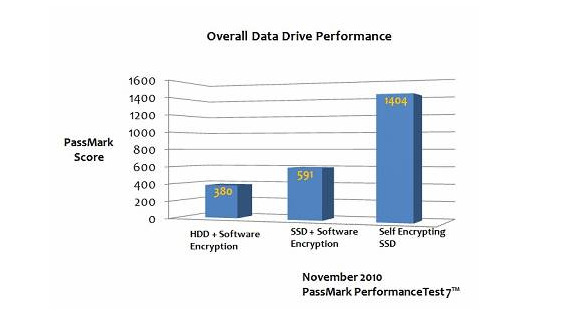Samsung Promises Highest Possible Level of Protection against Data Loss with Self-Encrypted SSD
Samsung's got a new Solid State Drive and they want you to take it for a spin. Samsung says it has the only Solid State Drive to feature Goverment-Grade AES 256-bit Encryption for the ultimate in security for your awesome files and such. This hardware encryption is always on, the data encryption and user authentication being performed "in the high security of the drive controller" instead of where it'd normally be stored, in the software. Software encryption works using the main CPU of the computer and stores info in the relatively insecure memory of the system, while SEDs (self-encrypting drives) encrypt at the speed of the interface making no impact on performance in the protected hardware of the SSD.
Inside this monster you'll find AES encryption capability extended to 256 bit keys, secure updates of firmware in the drive, and soon FIPS 140-2 certification ("FIPS 140-2 is a set of widely acknowledged cryptography requirements issued by the National Institute of Standards and Technology (NIST)"). They've even got a graph showing you how awesome this SSD is! Done by Trusted Strategies earlier this month (November 2010), this graph shows how much better a system performs with a self-encrypting SSD compared to software encryption. So much better! As in, 2.4 times better performance than SSD + software encryption and basically 3.7 times better than a crappy ol' HDD + software encryption. Take a look at the whole press release below:

Samsung SSD Self-Encryption Provides Highest Level of Protection against Data Loss
Samsung has only SSD to feature Government-Grade AES 256-bit Encryption for Heightened Security
San Jose, CA — November 23, 2010 — Samsung Electronics Co., Ltd. today said its new solid-state drive (SSD) with built-in hardware encryption provides the highest level of protection against unauthorized access to sensitive information on a lost or stolen laptop. The new Samsung SSD is also light, rugged and reliable, adding to its usefulness for today's traveling professionals and others using corporate PCs.
"Faster and more secure than its predecessor, our new corporate-focused SSD is the only one with self-encryption built on TCG's Opal standard that's available on the market today," said Jim Elliott, Vice President, Memory Marketing and Product Planning, Samsung Semiconductor, Inc.
The loss of sensitive information as a result of a misplaced or stolen laptop is a growing concern. Beyond impacting a company's reputation and credibility, such occurrences can result in steep financial penalties. The financial impact is up to $200 per lost record, including costs of customer notification and legal fees.
The Samsung SSD features advanced hardware-based self-encryption to protect confidential data from unauthorized access. This security capability is based on the industry's leading Trusted Computing Group's Opal standard and features stronger 256-bit Advanced Encryption Standard (AES) keys. The hardware encryption is always on, and both the data encryption and user authentication are performed in the high security of the drive controller, rather than being stored in software. Software encryption performs encryption using the main CPU of the PC and stores protected data in the insecure memory of the system; in contrast, self-encrypting drives (SEDs) encrypt data at interface speed with no impact on performance within the protected hardware of the SSD.
In fact, a research report on Samsung's self-encrypting SSD, "Full Drive Encryption with Samsung Solid State Drives," was released by Trusted Strategies earlier this month showing superior performance for a system equipped with a self-encrypting SSD over others using software encryption. As noted in the white paper, test results showed that a notebook PC system equipped with a self-encrypting SSD attained a 2.4 times higher level of overall performance than an SSD with software encryption and 3.7 times higher performance level than an HDD with software encryption (see graph below).
Key drive attributes include:
· AES encryption capability extended to 256 bit keys
· Firmware in the drive can be securely updated
· In the process of attaining FIPS 140-2 certification. FIPS 140-2 is a set of widely acknowledged cryptography requirements issued by the National Institute of Standards and Technology (NIST)
The Samsung SSD supports a variety of management software. SSD's self-encryption and management software work together as essential parts of a fully managed hardware-based encryption solution. Among client software that Samsung SSD supports is EMBASSY® Trusted Drive Manager from Wave Systems (NASDAQ:WAVX). It provides backup and recovery for user passwords; manages advanced security settings; and enables pre-boot authentication and single sign-on to Windows®.
"Samsung continues to pioneer the field of flash-based storage devices, and there's no better evidence of this than its new self-encrypting SSDs," said Brian Berger, Wave's Executive Vice President of Marketing & Sales.
Besides its security advantages, the Samsung SSD for corporate PCs provides sequential read/write speeds of up to 250/220 MB/s, and weighs 25 percent less than most traditional HDDs, providing a powerful combination of security, performance and convenience for corporate users on the go.
For more information about Samsung SSDs, please refer to www.samsungSSD.com
About Samsung Electronics Co., Ltd.
Samsung Electronics Co., Ltd. is a global leader in semiconductor, telecommunication, digital media and digital convergence technologies with 2009 consolidated sales of US$116.8 billion. Employing approximately 174,000 people in 193 offices across 66 countries, the company consists of eight independently operated business units: Visual Display, Mobile Communications, Telecommunication Systems, Digital Appliances, IT Solutions, Digital Imaging, Semiconductor and LCD. Recognized as one of the fastest growing global brands, Samsung Electronics is a leading producer of digital TVs, memory chips, mobile phones and TFT-LCDs. For more information, please visit www.samsung.com.
